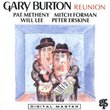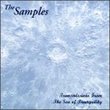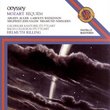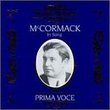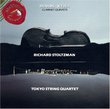| All Artists: Sergey Prokofiev, Neeme Jarvi, Edwin Paling, Scottish National Orchestra Title: Sergey Prokofiev: Symphony No. 2 in D minor, Op. 40 / Romeo and Juliet, Suite No. 1, Op. 64 bis - Neeme Järvi Members Wishing: 1 Total Copies: 0 Label: Chandos Release Date: 10/9/1992 Genre: Classical Styles: Historical Periods, Modern, 20th, & 21st Century, Symphonies Number of Discs: 1 SwapaCD Credits: 1 UPC: 095115836828 |
Search - Sergey Prokofiev, Neeme Jarvi, Edwin Paling :: Sergey Prokofiev: Symphony No. 2 in D minor, Op. 40 / Romeo and Juliet, Suite No. 1, Op. 64 bis - Neeme Järvi
 | Sergey Prokofiev, Neeme Jarvi, Edwin Paling Sergey Prokofiev: Symphony No. 2 in D minor, Op. 40 / Romeo and Juliet, Suite No. 1, Op. 64 bis - Neeme Järvi Genre: Classical
|
CD DetailsSimilar CDs
Similarly Requested CDs |
CD ReviewsYou Are Not Alone R. Williams | Los Angeles, CA United States | 01/24/2002 (5 out of 5 stars) "To the prior reviewer: No, you are not hearing things, this work is an insane masterpiece that not only stands up to intense multiple (and repeat) listenings, but glows brighter.Just to set the record straight: the story is that after the premiere, where the audience gave the piece a very chilly reception, Prokofiev was quoted outside the hall as saying 'neither I nor anyone in there understood a single note of what was played'. Obviously a psychotic remark induced by trauma. In fact, late in life, Prokofiev said he thought this was one of his great works. (Tchaikovsky went back and forth about his Manfred Symphony, calling it one of the best things he ever wrote, then referring to it as execrable after it had premiered, and then later recognizing again its beauty. Like that piece, nevermind the author's opinion, believe me you will be convinced of the genius of this music each time you listen to it.)" SYMPHONY OF IRON AND STEEL DAVID BRYSON | Glossop Derbyshire England | 06/28/2004 (5 out of 5 stars) "It would not do for me to claim to understand Profofiev's second symphony when the composer famously said that he didn't understand it himself. However it must be, surely, that we're talking on different planes of understanding. What I mean for my part is that Prokofiev is a composer I take to naturally and easily as I do to Stravinsky, whereas I usually have a bit of a struggle with the more eclectic and unpredictable Shostakovich. For some reason, Prokofiev's symphonies have not established themselves to anything like the extent that Shostakovich's have, and the second in particular has a reputation for being `difficult'. It was first performed in Paris in 1925, and its first British performance was not until 40 years later. In the 1920's Parisian taste favoured Les Six (Honegger, Frank Martin etc) in what seems to me a rather superficial and ooh-la-la kind of way. When Prokofiev decided to give them something of his own on similar lines, they reacted with bafflement on being confronted with music of genuine substance, just as they had done when they misbehaved childishly at the premiere of the Rite of Spring not 15 years earlier. These days I can't really see why anyone who can cope with the Rite of Spring, surely not much of a hurdle, should have any great difficulty with Prokofiev's second. It's noisy and vehement to be sure, but so is much of Beethoven's 7th and even the first movement of Brahms's first. One thing is for certain - you don't have to go to it, it comes to you. I personally like the way Jarvi goes about it. He doesn't pull any punches and I would not have wanted him to. It's a controlled assault on the ears and on the understanding, but it doesn't take the same kind of toll of my emotions that much of Shostakovich does, or even that much of Schubert does, or Brahms. By way of balance, the other item on the disc is the first Romeo and Juliet suite, a welcome change from the more familiar second. This is actually a later work than the symphony, but the idiom, I hardly need remind anyone, is fairly traditional, the composer showing his lovely, genuine and underivative lyric gift. The Scottish National Orchestra, not apparently yet `royal' in 1985, acquit themselves very well indeed. The recording is pretty good too. It takes no chances with the violent orchestration in the symphony, and if I felt a slight wish that it had now and again, I suppose that playing safe was really the wisest course. The liner note, by Noel Goodwin, is one that I would call a model of its type. It is fairly brief and addressed to the general reader not to the scholar or specialist, but it has something useful and constructive to say without being platitudinous, patronising or pretentious. I would genuinely like to plug this record if I can, as this symphony still has some kind of barrier against its general acceptance. To any hesitant music-lover I would say just this - the ballet suite is music of immediate appeal and probably not over-familiar. As for the symphony, just relax and let it hit you." Neeme Järvi Explains Prokofiev's Enigmatic Second Symphony Grady Harp | Los Angeles, CA United States | 04/05/2006 (5 out of 5 stars) "Neeme Järvi has recorded the entire cycle of Prokofiev symphonies and in doing so has gained the insights necessary to clarify much of the 'mystery' that surrounds the Symphony No. 2. Perhaps the fact that Prokofiev's 1st symphony,'Classical', was so immediately accessible, so retrospective despite its wonderful excursions into strange rhythms and tonalities, perhaps that is the reason so many find the 2nd 'difficult'. Yes, it is a strident, aggressive, acerbic work that drives forward with the kind of energy that is present in the 'style mechanique' found in Honneger's 'Pacific 231'. But it also contains some of Prokofiev's most eloquent, supple melodies as in the Andante. Hopefully there will be more frequent exposures to this work by our now more assertive young conductors, something that would doubtless increase the acceptance if not popularity of the symphony.
Neeme Järvi conducts his Scottish National Orchestra in this 1985 recording that is sonically alive and alert. The added work on the CD is the Suite No. 1 from Prokofiev's masterpiece, the ballet 'Romeo and Juliet' and Järvi pulls out all stops for a very exciting though short suite of excerpts. There are better recordings of the ballet, but the performance of the Symphony No. 2 more than recommends this CD. Grady Harp, April 06 " |

 Track Listings (15) - Disc #1
Track Listings (15) - Disc #1


